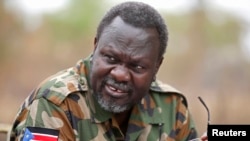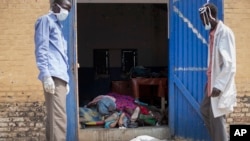Former South Sudan Vice President Riek Machar says his newly created SPLM/SPLA resistance movement will work to move the young country to democracy and equality.
The movement would "dedicate our time to the liberation of South Sudan so that we have a democratic, peaceful, prosperous natIon where elections would not be rigged, where people would not be intimidated, where there would be no one group trying to control others," he told VOA in a telephone interview from an undisclosed location.
"South Sudan needs to be liberated from the current dictatorship being established by Salva Kiir," Machar said, reiterating an accusation he made last year when he was removed from office in a cabinet reshuffle.
Machar accused Kiir of having "dictatorial tendencies" after the vice president and the rest of the presidential cabinet were fired in July.
Barnaba Marial Benjamin, who was then South Sudan’s Minister of Information and government spokesman, said at the time of the reshuffle that Kiir acted within the constitution.
Marial, who was re-appointed to the government, where he currently serves as foreign affairs minister, also said it was likely the restructuring of the government would generate heated debate within the ruling Sudan People’s Liberation Movement (SPLM).
Even after his firing, Machar remained a high-ranking member of the SPLM, which is currently the only viable party in South Sudan. While many other parties exist, most have tiny membership numbers.
In his interview with VOA, Machar said creating a multi-party system would be a key step towards installing a democratic system of government in South Sudan.
"I want the international community and the people of the region and our own country to understand that for this country to be viable, it must be committed to democratic multipartism. It must be a country where good governance prevails, a country where there is tolerance," Machar said.
"It must be a country where everyone has a share of the national cake, where one ethnic group does not try to impose its will on others," Machar said.
South Sudan's ambassador to the U.S., John Akec Khoc, in an interview last week with VOA rejected Machar's accusation's that Kiir's government is undemocratic.
Instead, Khoc said, Kiir is known for being inclusive, and gave the example of the president's successful effort to bring former rebel fighters into South Sudan's army.
Machar's successor to the vice presidency, James Wani Igga, accepted VOA's request for an interview to allow the government to respond directly to Machar's accusations, but canceled early last week.
VOA is trying to reschedule the interview with Igga or another high-ranking member of Kiir's government.
Machar has given two interviews to VOA, both from undisclosed locations since unrest erupted in South Sudan in December. The former vice president has been in hiding since mid-December when South Sudan plunged into violence that Kiir said was triggered by a failed coup led by Machar and other disgruntled SPLM members.
Machar has denied having anything to do with a coup bid.
Thousands of people have been killed and nearly one million have fled their homes during weeks of fighting that took on ethnic overtones as backers of Kiir, a member of the majority Dinka ethnic group, fought loyalists to Machar, a Nuer.
Kiir called early on in the fighting for an end to targeted ethnic killings and vowed to bring to justice anyone found to be involved in what he called "such terrible acts."
The president called on all sides in the conflict, including Machar, whom he mentioned by name, to "put the interest of our newly independent nation first."
At a meeting this week of the SPLM, Machar's successor, Igga, denied that the violence was ethnically based, and called on the nearly one million South Sudanese who have fled their homes to return and help rebuild their shattered nation.
"If there are comrades who might have gone to hide because they happen to come... from the Nuer community... let them come back because the situation is normal. You can play your role in nation-building," Igga told some 400 SPLM members.
Machar, meanwhile, insisted that his resistance movement wants to use peaceful means, including the ballot box, to oust Kiir, but has been forced to take up arms to fend off attacks by government forces that the opposition says have continued even after the two sides signed a ceasefire last month.
Even as he spoke to VOA, sporadic clashes continued around South Sudan, with both sides blaming the other for starting the fighting.
At least 32 civilians were killed in a village near Bor, in Jonglei state, late last week, and the town of Leer in Unity state -- Machar's hometown -- was the scene of heavy fighting last weekend.
The U.S. State Department on Saturday expressed concern over "reports of violations by both the Government of South Sudan and anti-government forces of the Cessation of Hostilities agreement" signed last month at peace talks in Addis Ababa under the mediation of regional African body, the Intergovernmental Authority on Development (IGAD).
State Department spokeswoman Jen Psaki called on both sides to support the next round of talks for South Sudan, which will focus on establishing a political dialogue and building an "inclusive reconciliation process." Those talks are due to begin Monday in Ethiopia.
The movement would "dedicate our time to the liberation of South Sudan so that we have a democratic, peaceful, prosperous natIon where elections would not be rigged, where people would not be intimidated, where there would be no one group trying to control others," he told VOA in a telephone interview from an undisclosed location.
"South Sudan needs to be liberated from the current dictatorship being established by Salva Kiir," Machar said, reiterating an accusation he made last year when he was removed from office in a cabinet reshuffle.
Machar accused Kiir of having "dictatorial tendencies" after the vice president and the rest of the presidential cabinet were fired in July.
Barnaba Marial Benjamin, who was then South Sudan’s Minister of Information and government spokesman, said at the time of the reshuffle that Kiir acted within the constitution.
Marial, who was re-appointed to the government, where he currently serves as foreign affairs minister, also said it was likely the restructuring of the government would generate heated debate within the ruling Sudan People’s Liberation Movement (SPLM).
Even after his firing, Machar remained a high-ranking member of the SPLM, which is currently the only viable party in South Sudan. While many other parties exist, most have tiny membership numbers.
In his interview with VOA, Machar said creating a multi-party system would be a key step towards installing a democratic system of government in South Sudan.
"I want the international community and the people of the region and our own country to understand that for this country to be viable, it must be committed to democratic multipartism. It must be a country where good governance prevails, a country where there is tolerance," Machar said.
"It must be a country where everyone has a share of the national cake, where one ethnic group does not try to impose its will on others," Machar said.
Riek Machar on his vision for South Sudan
South Sudan's ambassador to the U.S., John Akec Khoc, in an interview last week with VOA rejected Machar's accusation's that Kiir's government is undemocratic.
Instead, Khoc said, Kiir is known for being inclusive, and gave the example of the president's successful effort to bring former rebel fighters into South Sudan's army.
Machar's successor to the vice presidency, James Wani Igga, accepted VOA's request for an interview to allow the government to respond directly to Machar's accusations, but canceled early last week.
VOA is trying to reschedule the interview with Igga or another high-ranking member of Kiir's government.
Machar has given two interviews to VOA, both from undisclosed locations since unrest erupted in South Sudan in December. The former vice president has been in hiding since mid-December when South Sudan plunged into violence that Kiir said was triggered by a failed coup led by Machar and other disgruntled SPLM members.
Machar has denied having anything to do with a coup bid.
Thousands of people have been killed and nearly one million have fled their homes during weeks of fighting that took on ethnic overtones as backers of Kiir, a member of the majority Dinka ethnic group, fought loyalists to Machar, a Nuer.
Kiir called early on in the fighting for an end to targeted ethnic killings and vowed to bring to justice anyone found to be involved in what he called "such terrible acts."
The president called on all sides in the conflict, including Machar, whom he mentioned by name, to "put the interest of our newly independent nation first."
At a meeting this week of the SPLM, Machar's successor, Igga, denied that the violence was ethnically based, and called on the nearly one million South Sudanese who have fled their homes to return and help rebuild their shattered nation.
"If there are comrades who might have gone to hide because they happen to come... from the Nuer community... let them come back because the situation is normal. You can play your role in nation-building," Igga told some 400 SPLM members.
Machar, meanwhile, insisted that his resistance movement wants to use peaceful means, including the ballot box, to oust Kiir, but has been forced to take up arms to fend off attacks by government forces that the opposition says have continued even after the two sides signed a ceasefire last month.
Even as he spoke to VOA, sporadic clashes continued around South Sudan, with both sides blaming the other for starting the fighting.
At least 32 civilians were killed in a village near Bor, in Jonglei state, late last week, and the town of Leer in Unity state -- Machar's hometown -- was the scene of heavy fighting last weekend.
The U.S. State Department on Saturday expressed concern over "reports of violations by both the Government of South Sudan and anti-government forces of the Cessation of Hostilities agreement" signed last month at peace talks in Addis Ababa under the mediation of regional African body, the Intergovernmental Authority on Development (IGAD).
State Department spokeswoman Jen Psaki called on both sides to support the next round of talks for South Sudan, which will focus on establishing a political dialogue and building an "inclusive reconciliation process." Those talks are due to begin Monday in Ethiopia.









